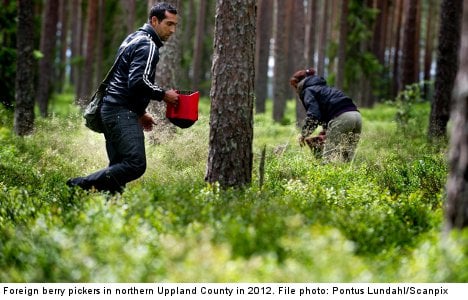On Wednesday, the Swedish Food Industry Association (Livsmedelföretagarna – Li) said it had struck a deal with berry sellers to make sure the Swedish consumer’s “appetite for berries” did not contravene good working conditions in the forests.
Since 2008, Sweden has allowed non-EU labour migration, but reports of poor working conditions plagued the country each summer, with international media also taking an interest in foreign workers plucking blueberries and other delicacies for Swedish consumers.
Since 2012, Swedish companies that want to bring in foreign workers must prove they have the financial means to pay out wages.
“Through tougher demands on all big actors in the food industry, as well as more in-depth cooperation with the authorities (…) the berry market today works much better,” the association’s statement read, adding that the presence of middle men on the market had previously made the industry difficult to monitor.
Since tales of employer misdemeanor got out, the Migration Board has worked with the police and other agencies to make sure the employees are treated fairly.
Among other measures, the Migration Board adopted terms from the collective bargaining deal between the municipal workers union Kommunal, which this season grants the berry pickers the right to a minimum monthly salary of 18,795 kronor ($2,800).
Now the food industry is set to launch an inspection system, which means representatives will check on and monitor working conditions for the berry pickers.
In 2009, almost 6,000 Thai berry pickers arrived in Sweden to scour Sweden’s forests and meadows for everything from the golden cloud berries (hjortron) in the north, to the red lingon berries that are a staple condiment in traditional Swedish cuisine.
To further ensure that berry pickers are well treated, Li and its member organizations will keep an eye on the industry.
“A shared control system will guarantee good and safe working conditions,” the statement read.
The report noted that berry picking had proved to be a considerable earner for many of the seasonal workers.
“A review showed that 96 percent of the berry pickers (who came to Sweden last year) had earned so much money they could pay off their debs, renovate or build new houses, invest in local civil society, and buy machines to use in the rice paddies,” the report claimed.
The Local/at


 Please whitelist us to continue reading.
Please whitelist us to continue reading.
Member comments